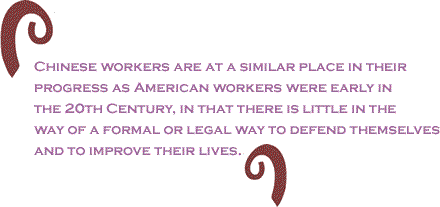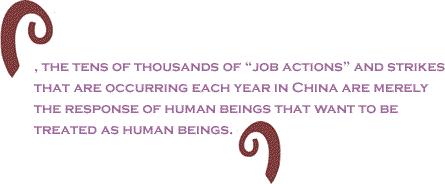|
Workers
in the fabled efficient and regimented factories in China,
where all of the electronic toys that the western world
uses every minute of every day, are becoming restless in
the slave-like condition in which they toil.
They
are sick and tired of the long days, the long weeks, the
often-dangerous conditions, the barbed-wire dormitories,
and the low pay of their jobs. They came from around their
country to work, but they did not think that they would
be kept like so much livestock.
What
is the solution to their complaints? They have, together,
demonstrated to the companies that make some of the most
popular electronic devices used by millions of Americans,
that they are sick and tired of the exploitation and they
want changes and they want them now.
The
way they’re talking, you’d think that there were union organizers
scattered broadly throughout their midst. But, you’d be
wrong. In China, it doesn’t work that way. Rather, the
tens of thousands of “job actions” and strikes that are
occurring each year in China are merely the response of
human beings that want to be treated as human beings. Without
actually being on the shop floors, it appears that these
actions are spontaneous and are just human reactions to
unbearable stresses and strains of their living and working
conditions.
Chinese
workers do, indeed, need unions. They need to be able to
work in conditions that are humane and bearable, because
they have had a direct hand in creating them. This is the
ideal of a broadly supported union movement within a democratic
society: people take charge of their lives and, in the
process, they make it better for their families, their own
communities, and, eventually, for the nation. That was
the idea, even in the U.S.

Somewhere
along the way in the U.S., however, the use of the First
Amendment by very powerful elements in society in the U.S.
resulted in a propaganda barrage that has turned the very
workers who would benefit from a union against the very
idea of a union. This assault has resulted in the Citizens
United U.S. Supreme Court decision, wherein five justices
of the court decreed that money is speech and corporations
are human beings. As such, Corporate America could spend
as much money as it wants to further its own agenda and
there shall be no curb on their acting as though they were
people.
As
a result, there is no stopping them in the political arena.
And, there is no convincing a sizable percentage of American
workers that there are profound benefits in joining a union,
which would provide higher wages, good benefits (including
health care), and a secure retirement. The corporate propaganda
has worked…for nearly a century. It has had four or five
generations to fully implant itself in the body politic.
Chinese
workers are at a similar place in their progress as American
workers were early in the 20th Century, in that
there is little in the way of a formal or legal way to defend
themselves and to improve their lives. Under those conditions,
workers spontaneously react to abuse and exploitation.
That’s what American workers did and that’s what Chinese
workers have been, and are, doing.
Each
year there are scores of thousands of job actions and strikes
in China, some have involved burning cars and destruction
of other property. Most of the actions, however, have been
non-violent and there have been some concessions by authorities,
some higher pay and improved working conditions. To accomplish
small progress, it has taken unrest that would be unheard
of in the U.S., at least in 2012. China has about one billion
more in population than the U.S., so it takes much tighter
control measures to handle the millions of workers in their
cities and factories.
One
of the ways that they have attempted to make a distinction
between urban and rural workers is a system of identification
papers, started in Mao’s time, which determines where one
can seek services, and there is no way without great difficulty
that they can change rural papers to urban ones. Rural
workers who work in urban factories are called migrant workers
in China and those workers can be forced to send their children
back to their rural villages for schooling, housing, welfare,
or other services. A December 2011 BBC report noted that
officials have admitted that granting equal rights to migrant
workers is a “major challenge.”
And,
the rural workers are not going to return to their villages,
even though conditions are not good in the urban factories,
like those in Guangzhou, described by BBC as “China's manufacturing
megacity.” There are 14 million workers in that city alone
and seven million of them are migrants. Workers in other
areas of life in the hub city, such as bus drivers and laborers,
have taken job actions or strikes and the inclination to
do so is growing.

Workers
may not know what it is that they are manufacturing, but
they know they want to live more like the people who buy
those products at the retail end. They want the same things.
They want to be consumers, for better or worse, not just
cogs in a manufacturing machine. A growing number of North
Americans, Europeans, and Japanese are beginning to realize
the limits to a consumer society and the potential harm
to the ever more fragile environment that is so negatively
affected by such a system. They are trying to change that
system to a more sustainable one, but it’s a tough sell.
The
average Chinese worker, farmer, or laborer doesn’t want
to hear about the necessary austerity of a more sustainable
society. People earning a few dollars a day for a 16-hour
day and a six-day week want higher pay, benefits, security
in old age, good food and education for their children.
They want what other people in other countries want.
This
presents a problem for workers and consumers in other countries,
who want cheap electronics and computers, yet they probably
(most of them, anyway, in the abstract) would say that all
workers should be treated fairly and compensated properly.
But, are they willing to pay twice as much for their cell
phones, computers, and other devices, so that Chinese workers
can be paid a decent wage and live at a decent standard
of living? It’s not likely. They might be willing to pay
a little more, but not so much as to achieve what we might
call a living wage.
In
a country where legal remedies time-consuming and rare,
the people, whether they are professors, laborers, doctors,
farmers, or factory workers, are finding that direct action
is the quickest to gain the attention of the government.
A riot may even be better. The government and the richest
entrepreneurs in China just want the problem to go away
and are becoming more willing to negotiate an end to the
strife, so that they can get back to making money.

It
appears that Chinese workers, unlike most U.S. workers today,
are beginning to understand that concerted action is vital
to advancement of the working class. This is something
that most U.S. workers once understood. Out of that understanding
came the union movement, which improved working class life
and set the standard for all workers in the nation. Somewhere
along the way, they fell prey to a philosophy that eventually
led them to believe the propaganda that “hard work would
be rewarded and the boss’ door is always open…just as long
as you do not have anything to do with a union.” What they
were not noticing was that, as long as there was a strong
union movement, the living standard of all workers was improved
and enhanced, and they had some democracy in the workplace.
Along the way, that knowledge was lost, the union movement
was diminished, and the living standard of U.S. workers
has dropped like a stone.
Workers
in this country have to summon the grit that it will take
to equal the Chinese workers’ courage, even in the face
of a repressive regime. In solidarity, U.S. workers need
to say that they will be willing to pay more for products
that come out of wage slavery, or worse. Unless and until
workers in other countries have a decent standard of living,
few manufacturing jobs will return and there will be a wrenching
period of adjustment for the U.S. working class, until there
is a different way of providing energy and a different way
of producing the things that we need.
In
the meantime, workers in China will have to fight the same
fights that were fought in 1930s America, leading to that
short period of our history when workers joined together,
in unions, and showed what can be accomplished when democratic
principles are put into effect. Chinese workers don’t have
the same amount of time to accomplish their goals, but then,
considering the state of working America, neither do we.

BlackCommentator.com
Columnist, John Funiciello, is a labor organizer and former
union organizer. His union work started when he became a
local president of The Newspaper Guild in the early 1970s.
He was a reporter for 14 years for newspapers in New York
State. In addition to labor work, he is organizing family
farmers as they struggle to stay on the land under enormous
pressure from factory food producers and land developers.
Click here
to contact Mr. Funiciello.
|

